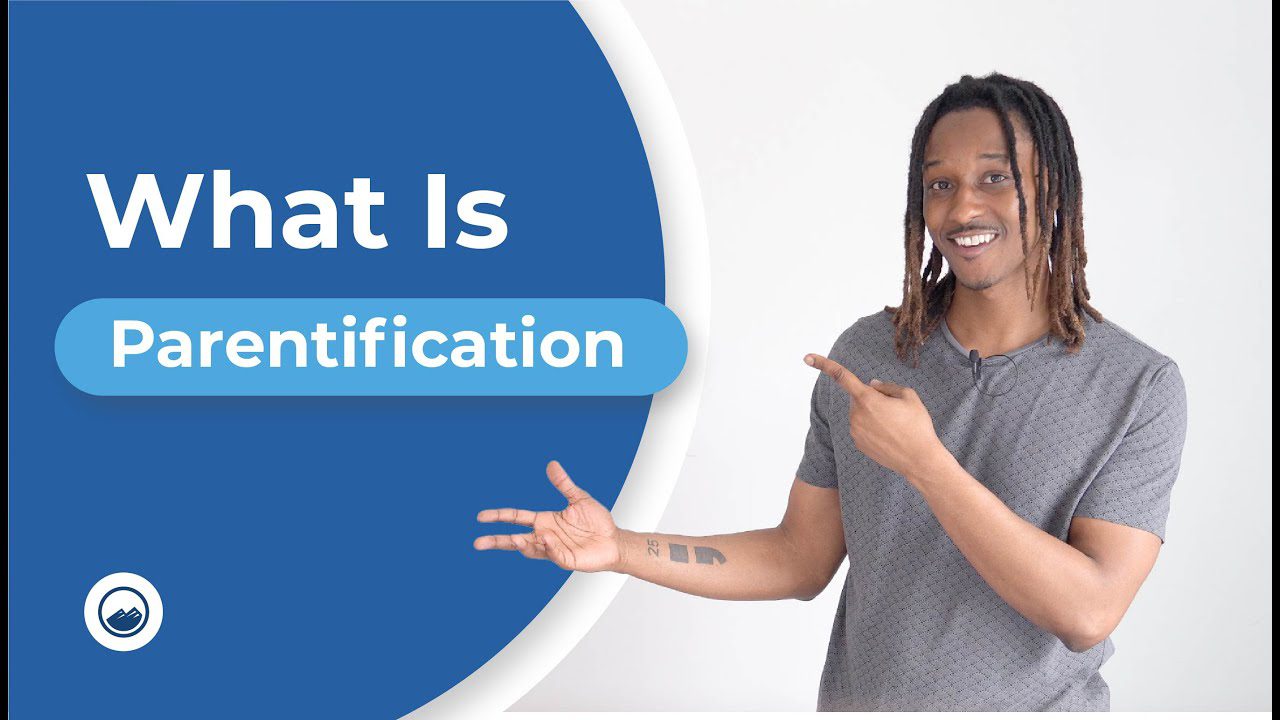#1. What Is the Definition of Parentification?
Parentification happens when a child is made to take on the role of an adult emotionally, financially, or through other responsibilities, without support from their parents or other adults.
This can harm the child’s development and lead to a number of mental health problems and negative outcomes later in life.
Hungarian-American psychiatrist and a founder of family therapy Ivan Boszormenyi-Nagy used the term “parentification” to describe a “distortion or lack of boundaries” with the family system resulting in “children [taking] on roles and responsibilities usually reserved for adults.”
A lack of healthy boundaries is the root of parentification.
A child’s life becomes disrupted to take on responsibilities usually reserved for parents or caregivers. Children end up taking on a parental role within the household.
Parentification often occurs when parents or other primary caregivers are unable or unwilling to take on the responsibilities of the household.
Children become highly responsible for their age and do not experience a normal childhood of freedom, play, and living carefree.
Children might be forced into a role reversal of being the adult in the household when their primary caregiver:
- Struggles with alcohol or substance abuse
- Is physically disabled
- Has a serious or chronic medical condition
- Does not have emotional support from their parenting partner or other adults
- Suffers from a mental illness
- Experienced neglect or abuse when they were a child
Other reasons for parentification include:
- Poverty and financial hardships
- Children might be required to care for younger siblings when parents cannot afford a babysitter
- When parents need to work multiple jobs, they might not be home very much and lean on older children to tend to adult responsibilities after school and on weekends
- When children need to work to help support the family
- Divorce can create rifts in the family system
- Parents might go to their child for emotional support during a divorce, crossing appropriate boundaries
- Parents might also put their children in the middle of the conflicts during divorce
- The illness or disability of a sibling
- A disabled or chronically ill child might require help from everyone in the household
- While physically healthy children help care for a disabled sibling, they might not have their own needs met while growing up
Parentified children might not have room for the type of freedom that generally occurs during childhood. The roles that these children take on can consume most of their free time. They might not have many friends or a life outside of the home due to these responsibilities.

Typical roles of parentified children include:
- Being a caretaker to younger siblings
- Acting as a confidant to parents
- Providing emotional support to parents
- Mediating conflict among parents and other family members
- Getting pulled into arguments between parents or caregivers
- Given household responsibilities that are not age-appropriate
The roles of parentified children break down into two types of parentification:
- Instrumental parentification:
- Caretaking of disabled or younger siblings
- Paying bills
- Cleaning, cooking, grocery shopping, and running the household
- Speaking on behalf of parents when parents do not speak the primary language of their country
- Emotional parentification:
- Being a confidant for parents
- Listening to parents talk about their own problems (without parents listening to their child’s problems)
- Providing emotional support to parents
- Being expected to give advice to parents
- Mediating conflicts in the household
Parentification often involves a combination of all of these roles. Not all of the effects of parentification are negative. Some parentified children grow up to be responsible, caring, and empathetic adults.
It is okay and healthy to give children some tasks to help out around the house and learn to be responsible.
When kids are given tasks to help out around the house, they learn to be competent and feel like they contribute to the family. However, kids still need to be kids and should not feel the burden of responsibility for caring for the family’s needs without the guidance of a parent.
It is also okay to talk with your kids about your feelings or struggles when you are age-appropriate.
Young children are going to know when you feel stressed, unhappy, or sad. If you don’t find a way to talk to them about why, they are likely to blame themselves. The brains of young children are not fully developed, and they are ego-centric.
Telling your child that you had a bad day at work or are dealing with other stressors can reassure young kids that your feelings are not their fault or responsibility to fix.
Emotional parentification generally leads to more negative effects than does instrumental parentification.
However, many parentified children grow up to be adults with “lost childhoods,” unhealthy attachment patterns, mental health or substance use disorders, and other adverse effects from parentification.

#2. How Does Being Parentified Affect Mental Health?
Being parentified can affect mental health differently for each parentified child as they grow up.
It is important to note that not all parentification leads to negative mental health outcomes. Some parentified children grow up to be highly responsible, empathetic young adults. The circumstances surrounding parentification often determine the outcomes.
From Lisa M. Hooper’s 2008 article, “Defining and Understanding Parentification: Implications for All Counselors,” “parentification can be perceived as traumatic, as stressful but not traumatic, or as a regular, even an anticipated cultural event in the course of daily living.”
The effects of parentification can have a range of mental health outcomes depending on perceptions, expectations, rewards, and cultural differences.
If a child feels that taking on adult responsibilities was fair, rewarded, and acknowledged, they tend to have better mental health outcomes.
For example, a child helping out at home due to a disabled parent who praises the child and acknowledges the help might not experience adverse mental health issues. But if parentification is due to neglect and other trauma, the child’s mental health might suffer.
Parentification tends to coincide with other traumatic experiences, which can harm your mental health. For example, you might need to take on adult responsibilities while living with poverty and food insecurity.
Lisa M. Hooper notes some of the following aspects that can create different mental health outcomes for adults who were parentified children:
- Was the parentification long-term or brief?
- What was the age of the child during this time? If parentification began during the teen years, your mental health might not be as affected as those who took on adult responsibilities as younger children.
- Did you experience instrumental or emotional parentification?
- Are these responsibilities normal and expected in your culture?
- How fair did you perceive your duties to be?
- Were you acknowledged for your help or overlooked?
- Can you identify both the positive and negative impact of parentification in your life?
Negative impacts of parentification often have to do with adverse childhood experiences (ACE) and unhealthy attachment patterns. Both ACEs and unhealthy attachment can impact your mental health long-term when left untreated.
According to the Centers for Disease Control and Prevention (CDC), “ACEs are linked to chronic health problems, mental illness, and substance use problems in adulthood. ACEs can also negatively impact education, job opportunities, and earning potential.”
ACEs cause childhood trauma and lead to issues as they grow up. Some negative childhood experiences can last a lifetime. As stated in a Permanente Journal article on ACEs, “One doesn’t ‘just get over’ some things.”
Some of the negative ways that parentification can affect you include:
- Struggle to develop trust with others
- Prone to forming unhealthy and even violent adult relationships
- Difficulty with co-dependency, as you might struggle to function independently
- Increased risk of chronic physical illness
- Risk of mental health disorders, like depression, anxiety, alcohol and substance use disorders, or eating disorders
If you have grown up too soon or took on adult responsibilities at a young age, you might experience the negative impacts of parentification. To heal, you might need to begin working with a psychotherapist or other mental health professional.

#3. How Do You Heal From Parentification?
You can heal from parentification by getting in touch with your “inner child” and addressing underlying trauma in therapy.
Parentified children often do not get a chance to experience the freedom generally reserved for children. While you might have developed positive traits, like responsibility and empathy, you might struggle to meet your own needs as an adult.
As a child, you could not meet your own needs without help from a caregiver or parent. You depend upon your parents for all the basics, like food, clothing, shelter, safety, and security.
Beyond the basic needs, you also needed unconditional love, acceptance, and a sense of belonging from your primary caregivers.
The foundation of your emotional development hinges on feeling that your primary caregivers love and accept you no matter what. When these needs are unmet, you might grow up feeling the effects of these unmet needs.
As an adult, you are now responsible for your own needs. When therapists and counselors talk about your “inner child,” they are talking about figuring out what needs were unmet as a parentified child.
Parentified children might struggle with some of the following unmet needs:
- Lack of freedom and room for creativity due to taking on adult responsibilities
- Lack of structure, you might have never known what to expect from day-to-day
- Very little praise, love, or acknowledgment
- Never feeling a sense of belonging outside of the home due to being “tied down” with responsibility
- Never feeling safe or secure; life might feel full of uncertainty and chaos
An excellent place to start healing from parentification is to identify your unmet needs. If you need structure, create a routine. If you need praise, ask your boss for feedback at work, or remind your loved ones what you need to hear.
As an adult, you can give yourself the things you need that you did not get as a child.
You can also reach out to a therapist or a support group. Al-Anon can be a great place for adult children of parents with alcohol or substance abuse issues. Since parentification is often the result of adverse childhoods, therapy can help you heal from these traumas.
Seeking help from a psychotherapist or mental health counselor can help you deal with the trauma of adverse childhood experiences (ACEs).
Healing from your childhood trauma is essential. Traumatic experiences can change the way your brain functions and processes information. By entering therapy, you can begin to heal the way that your brain is wired.
Common treatments for trauma include:
- Eye movement desensitization and reprocessing (EMDR)
- Cognitive-behavioral therapy (CBT)
- Dialectical behavior therapy (DBT)
In addition, if you developed a substance or alcohol use disorder to cope with being parentified, you might need substance abuse treatment. Many treatment facilities offer dual-diagnosis care for those with co-occurring mental health and substance use disorders.

#4. Is Parentification Emotional Neglect?
Parentification can be thought of as emotional neglect, though this neglect is often unintentional.
Your own parents might not have realized the impact of putting adult responsibilities on your shoulders when you were a child. They might have been raised similarly, as parentification can occur from one generation to the next.
If your parents had an undiagnosed mental illness or substance use disorder, they might have been unsure how to care for themselves or their family’s emotional well-being.
However, you most likely felt some form of emotional neglect when you were parentified. Your own needs were also set aside to deal with your parents’ emotional or instrumental needs.
Your parents might have never asked you how you were feeling or considered your thoughts when they leaned on you for emotional support. Your emotional well-being was pushed aside for other tasks that were considered more important.
For your parents, they were most likely in “survival mode” themselves. They most likely struggled to meet their own needs appropriately and looked to you for that support.
Unfortunately, they might have neglected your emotions when they could not even care for their own emotions.

#5. What Are Signs of Parentification?
Signs of parentification include:
- Struggle to ask for help, perhaps even thinking that reaching out for help is a sign of weakness
- High sense of self-reliance
- Being highly responsible at a young age
- Your self-esteem is tied into how responsible, disciplined, and well-behaved you are
- Difficulty letting loose or having fun
- Feeling accountable for being the peacemaker when others have conflicts
- Being a caregiver feels good, even if it comes at the expense of your own well-being
- Feeling like you had a “lost childhood”
- Never feel that your efforts are appreciated by others
- Heightened sense of empathy
- Difficulty with trust in relationships
- Need to feel in control at all times
- Being a “people-pleaser”
If you have some of these struggles as an adult, you might have been parentified as a child. You can heal from parentification by seeking support and treatment.
Of course, you might struggle to get help or trust others if you were parentified. You might need to practice asking for help and trusting others. Support groups can be a great place to begin to hear the stories of others who have similar issues.

#6. How Do You Set Boundaries With Toxic Parents?
You might have a difficult time setting boundaries with toxic parents if you were a parentified child.
As a child, you could not say “no” to your parents very easily. You also might not have realized that your relationship was not normal or healthy. You might not even realize that you can set boundaries and say “no” to your parents or others.
Setting healthy boundaries with toxic parents can help you heal from emotional parentification. You might have never learned how to set boundaries with others. You might even feel guilty or selfish when setting boundaries.
Keep in mind that this might feel uncomfortable at first; however, setting boundaries is a skill. You can get better and more comfortable with time and practice.
To set boundaries with toxic parents, use the following tips:
- Identify your own needs first. Ask yourself why do I need this boundary? You might need more time for yourself, your own children, or other areas in your life.
- Be direct. Clarity is important when setting boundaries. When your boundary is straightforward, you leave less room for miscommunication.
- Be polite, but don’t apologize for addressing your own needs. You don’t need to make things personal or be rude about boundaries. You also don’t need to explain yourself or apologize for taking care of yourself.
- Practice during therapy. Group therapy sessions are a great place for you to practice communicating your needs. You can also role-play with a counselor or other person in your support system.
- Start with strict boundaries. It will be easier to lighten up strict limits than to make those boundaries more stringent after the fact. You can think of setting boundaries like a negotiation. Start higher and work out compromises.
- Let others know when they crossed a boundary. Maintenance is key to boundaries. Toxic parents might test your limits or push the boundary. Be sure to tell them sooner than later when they cross a boundary with you!
You might struggle to set boundaries or say “no” to other people in your life, even people who aren’t considered “toxic.” It is okay to take time for yourself and set limits with others. Self-care is not selfish. Caring for your own needs is crucial for your overall health and well-being.
Your needs matter, and as an adult, you get to determine your priorities and live your life the way you choose.
Parentification can have negative effects on the emotional, physical, and mental health of children as they grow into young adults. Sandstone Care is here to support teens and young adults with mental health and substance use disorders. Call (888) 850-1890.






